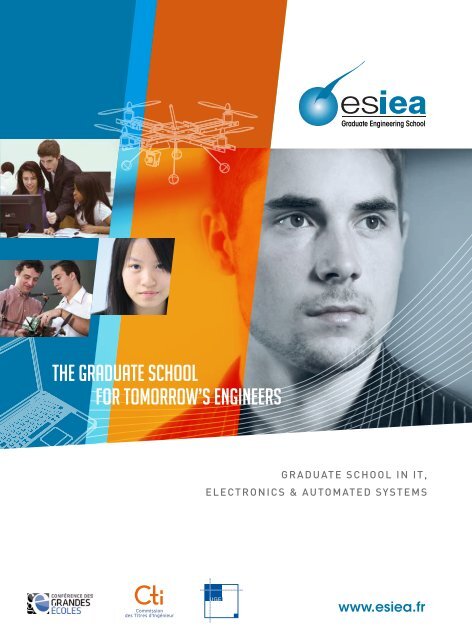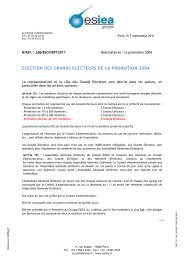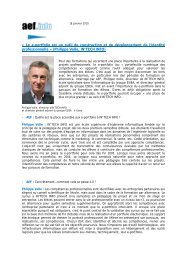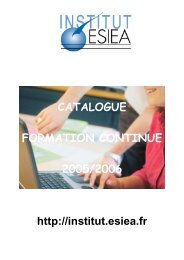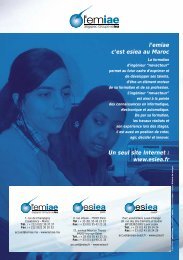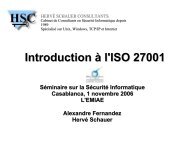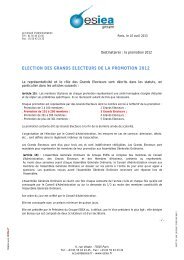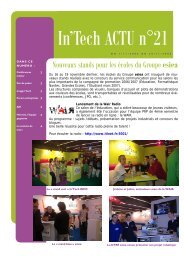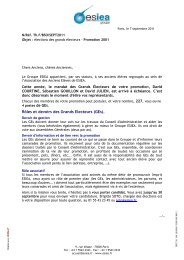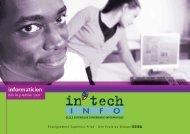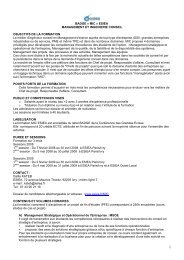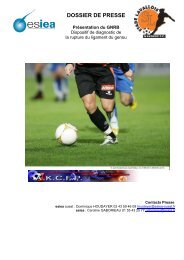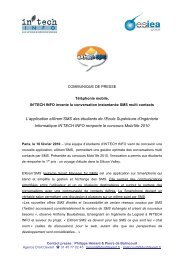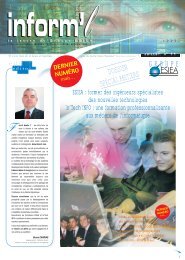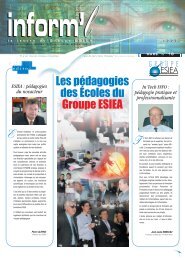THE GRADUATE SCHOOL FOR TOMORROW'S ENGINEERS - ESIEA
THE GRADUATE SCHOOL FOR TOMORROW'S ENGINEERS - ESIEA
THE GRADUATE SCHOOL FOR TOMORROW'S ENGINEERS - ESIEA
You also want an ePaper? Increase the reach of your titles
YUMPU automatically turns print PDFs into web optimized ePapers that Google loves.
<strong>THE</strong> <strong>GRADUATE</strong> <strong>SCHOOL</strong><br />
<strong>FOR</strong> TOMORROW’S <strong>ENGINEERS</strong><br />
Graduate Engineering School<br />
Graduate School in it,<br />
electronicS & automated SyStemS<br />
www.esiea.fr
02<br />
Become an <strong>ESIEA</strong> engineer<br />
INTRODUCTION FROM <strong>ESIEA</strong> GROUP’S DIRECTOR<br />
Welcome to <strong>ESIEA</strong>, the Graduate School that provides not only high level engineering training but<br />
also develops the personal abilities of our students, giving them life skills that make all the difference!<br />
<strong>ESIEA</strong>, recognised by the State, authorised by the CTI (a government body for quality assurance in<br />
graduate engineering schools) and a member of CGE (Conférence des Grandes Ecoles), has built<br />
its reputation on transferring knowledge, know-how and life skills to its future graduates, enabling<br />
them to enter their first position swiftly and to develop their career in a continuously changing world.<br />
We are proud of the quality and diversity of our 6,200 graduates’ career paths and this confirms<br />
that our school is firmly in touch with reality.<br />
The Alumni, who have been owners of the school since 1986, are involved with the students in different<br />
years, enabling them to benefit from their expertise, experience and their professional networks.<br />
In practical terms, what can one learn at <strong>ESIEA</strong>? Our ambition is to train engineers as designers,<br />
developers, system and application integrators by combining coursework in IT, electronics<br />
and automated systems. They know how to design, to model and to simulate a process seen<br />
in numerous fields with the use of new technologies e.g. designing a drone, safeguarding<br />
a computer network, carrying out medical imaging, setting up interbank communication<br />
systems, to name but a few.<br />
Given the broad training on offer, they also have the opportunity to acquire solid technical skills<br />
in one of the research fields within the school or to expand their skills by working in conjunction<br />
with our academic partners in France or abroad. Whether it be through the courses taught, the<br />
teamwork on practical projects or humanitarian, cultural or sporting activities, our students find<br />
the means to stimulate their creativity, and to develop their taste for innovation, their capacity<br />
to adapt and their sense of communication. The wide range of<br />
possibilities, the freedom of choice and proximity<br />
to permanent teaching and research staff help<br />
students to build their own paths, making them<br />
unique <strong>ESIEA</strong> engineers.<br />
KEY FIGURES<br />
90%<br />
of our students<br />
are recruited before<br />
graduation.<br />
The school is a place of reciprocal enrichment,<br />
for both the students and the <strong>ESIEA</strong> team,<br />
fostering the full potential of each and<br />
every one.<br />
Photo: Gérard Sanpité, year of graduation 1974,<br />
director of ESiEa Group, with Paris and Laval Student<br />
Union representatives.<br />
6,200<br />
alumni work<br />
in diverse sectors<br />
in large enterprises<br />
in France and<br />
internationally.
A COHERENT TRAINING PATH<br />
TO PLAN YOUR FUTURE<br />
The first three years at <strong>ESIEA</strong> provide students with a solid scientific-technical base.<br />
The last two years, of a more professional nature, give each student the opportunity<br />
to tailor their training path progressively to their individual needs.<br />
3 levels of study to reach your professional target<br />
Equivalent to<br />
preparatory classes<br />
Year<br />
1 st<br />
2 nd<br />
3 rd<br />
4 th<br />
5 th<br />
Baccalaureate S,<br />
STI, STL<br />
ADMISSIONS<br />
<strong>ESIEA</strong> has opened several<br />
channels offering access to its<br />
courses in order to objectively<br />
recruit the best profiles and to<br />
promote diversity, while respecting<br />
the candidates’ intellectual and<br />
personal qualities. Whether it be<br />
through entrance exams or parallel<br />
admissions the teachers and<br />
alumni participate actively in the<br />
recruitment process of each new class. <strong>ESIEA</strong> schools, recognised<br />
by the State, accept national grant holders.<br />
www.esiea.fr<br />
Admissions Objectives Internships<br />
CPGE 1 st Yr, Bac +1 with recognition<br />
in sciences, 1 st Yr BSc<br />
CPGE 2 nd Yr, 2 nd Yr BSc,<br />
ATS Preparatory class, DUT, BTS<br />
1 st Yr MSc<br />
No parallel admissions<br />
1 Electronic systems, electro-technology, IT and Industrial & Technical Services’ Networks,<br />
Industrial Physical Techniques<br />
2 Industrial IT and Electrical Engineering, IT, Networks and Tele-Communications,<br />
Physical Measurements.<br />
Transition level<br />
• to reinforce the basics required for<br />
scientific studies: mathematics,<br />
physics, IT, electronics and systems.<br />
Consolidation level<br />
• to acquire and consolidate<br />
fundamental scientific knowledge.<br />
• to learn how to carry out a<br />
teamwork project and bring it<br />
to fruition.<br />
Advanced level<br />
• to acquire the professional<br />
elements necessary to be an<br />
<strong>ESIEA</strong> engineer.<br />
1-month<br />
manual work<br />
placement<br />
2-month<br />
technical<br />
work<br />
placement<br />
9-month<br />
engineering<br />
work<br />
placement<br />
<strong>ESIEA</strong> ENGINEERING DEGREE<br />
2-month<br />
special<br />
assignment<br />
abroad<br />
03<br />
Entry to 1 st year<br />
• on the basis of entrance exam results for the holders<br />
of S, STI or STL Baccalaureate (application via the<br />
Post-Baccalaureate Admission procedure)<br />
• on the basis of secondary school achievement record for<br />
parallel admissions (Scientific Baccalaureate +1 in progress)<br />
Entry to 2 nd year<br />
• on the basis of achievement record and interview for holders<br />
of recognised Scientific Baccalaureate +1 (MPSI, PCSI,<br />
PTSI, 1 st year BSc, DUT/BTS without ENSEA entrance exam)<br />
Entry to 3 rd year<br />
• on the basis of e3a or Banque PT entrance exams for<br />
2 nd year preparatory classes (MP, PC, PSI, PT) and on<br />
the basis of ENSEA entrance exam for holders of the BTS 1 ,<br />
DUT 2 and ATS preparatory exam<br />
• on the basis of achievement record and interview for<br />
the Baccalaureate +2 and recognised BSc.<br />
Entry to 4 th year<br />
• on the basis of achievement record and interview<br />
for recognised Baccalaureate +4, Master 1 (IEA, EEA,<br />
IT, Mathematics)
04<br />
SHAPE YOUR PROFESSIONAL FUTURE<br />
Graduate Engineering School<br />
BROAD-BASED TRAINING<br />
• IEA (IT, ELECTRONICS,<br />
AUTOMATED SYSTEMS)<br />
FUNDAMENTALS<br />
• IT, ELECTRONICS & AUTOMATED<br />
SYSTEMS ENGINEER<br />
• TAILORED EDUCATIONAL<br />
GUIDANCE<br />
<strong>THE</strong> SOURCE OF YOUR TALENT<br />
• FROM CONSOLIDATING<br />
<strong>THE</strong> BASICS, TO PINPOINTING<br />
YOUR SPECIALITY<br />
• MAJOR AND MINOR SUBJECTS<br />
HUMAN DEVELOPMENT<br />
• LIFE SKILLS<br />
• A MAJOR ASSET <strong>FOR</strong><br />
TOMORROW’S <strong>ENGINEERS</strong><br />
• A LARGE-SCALE PROJECT<br />
EACH YEAR
A HIGH LEVEL FIVE-YEAR<br />
PROGRAMME TO SHAPE<br />
YOUR PROFESSIONAL FUTURE<br />
www.esiea.fr<br />
05
06<br />
DALILA KATEB<br />
doctor of Mathematics,<br />
in charge of programme<br />
development and Education<br />
“It is essential that students<br />
have comprehensive knowledge<br />
of the three complementary fields<br />
of IEA which are linked to human<br />
development so that they can<br />
grasp the complex nature of<br />
the systems as a whole.<br />
This is the only way in which they<br />
are able to define their personal<br />
development plan and build the<br />
study path best suited to their<br />
needs. For example: reinforcing<br />
scientific studies or developing<br />
managerial skills. The fact that<br />
these skills go hand in hand<br />
enables <strong>ESIEA</strong> students to adapt<br />
to obligations imposed by the<br />
working world, while being a<br />
member of the global society,<br />
being inquisitive, listening to<br />
others and being conscious<br />
of the importance of personal<br />
development and improving<br />
one’s performance.<br />
These qualities will find fulfilment<br />
in the context of their studies,<br />
as they are supplementary assets<br />
for the students’ personal and<br />
professional development.”<br />
SHAPE YOUR PROFESSIONAL FUTURE<br />
BROAD-BASED TRAINING THAT<br />
WILL MAKE <strong>THE</strong> DIFFERENCE<br />
<strong>ESIEA</strong>’s vocation is to offer broadbased<br />
training to engineering<br />
students by linking high-level<br />
scientific-technical studies with<br />
acknowledged soft skills. This<br />
coherence facilitates access to<br />
first employment and reinforces<br />
their ability to develop within<br />
organisations in a variety<br />
of different fields.<br />
Acquiring<br />
fundamental<br />
knowledge<br />
in IEA<br />
IT, Electronics and Automated<br />
Systems complement each other<br />
to form an overall tool, allowing<br />
<strong>ESIEA</strong> engineers to develop in<br />
all sectors of activity.<br />
IT, a driving force in everyday life, offers a multitude of prospects ranging from<br />
system and network administration or specialising in business software to becoming<br />
programmers and algorithmicians, who develop ergonomic, high-performance<br />
programmes in multiple fields of application (management, data bases, computer<br />
graphics, image processing, artificial intelligence and information security).<br />
Electronics and Automated Systems open doors to the building of real systems, such<br />
as embedded systems, virtual and augmented reality, robotic probes and industrial<br />
projects. There is no doubt that thorough knowledge of systems as a whole can be<br />
acquired, thanks to the study of programmable components, command principles<br />
and signal processing.<br />
What is<br />
an IEA engineer?<br />
• A broad-based engineer in the field of IT, electronics<br />
and automated systems.<br />
• An enthusiast for science and new technologies.<br />
• An engineer who knows how to design, make and<br />
implement product systems or services.<br />
• An innovative, creative architect of complex systems.<br />
• A leader with the ability to adapt to all situations<br />
and to work in a multi-technical, multicultural<br />
environment.<br />
80%<br />
Percentage<br />
of permanent<br />
teaching staff<br />
within the transition<br />
level available<br />
to students at<br />
all times.
Tailored educational<br />
follow-up<br />
Teaching staff attentive to your development and success<br />
The teaching team comprises highly qualified educationalists (lecturer-researchers,<br />
university doctorates, company consultants and specialists), who place the<br />
students at the heart of the pedagogical teaching system.<br />
They are available and ready to listen, attentive to the development of each and<br />
every student, whether it be a matter of overcoming a particular difficulty, extending<br />
specific knowledge or discovering a talent and putting it to use.<br />
Personalised support<br />
• Tutorials and support workshops<br />
• Streamed language classes<br />
• Initiation and methodology seminars for<br />
newcomers<br />
• Refresher courses prior to start of academic<br />
year (e.g. in maths and physics for holders<br />
of STI baccalaureate and in IT and<br />
electronics for the CPGE)<br />
Job opportunity in all sectors of activity*<br />
4,9 %<br />
6,6 %<br />
28 %<br />
10,2 %<br />
4,9 %<br />
38 %<br />
3,8 %<br />
5 %<br />
l IT: 38%<br />
l Software publishers: 5%<br />
l Telecommunications: 3.8%<br />
l Finance, banking and<br />
insurance: 10.2%<br />
l Industry (motor, aeronautic,<br />
naval, rail, pharmaceutical,<br />
agri-business, etc) 6.6%<br />
l Energy, Building and Public Works,<br />
Ecology and Sustainable<br />
Development: 4.9%<br />
l R & D, Auditing firms,<br />
Consultancy firms: 28%<br />
l Other (Marketing, Sales,<br />
Administration, etc): 4.9%<br />
* Trends concerning Young <strong>ESIEA</strong> graduates in a professional integration survey carried out<br />
by the Conférence des Grandes Écoles.<br />
www.esiea.fr<br />
JULIEN LEMETAYER,<br />
2009 YEAR OF GRADUATION<br />
“What makes the <strong>ESIEA</strong> engineering<br />
training so rich is the wide range of<br />
07<br />
subjects taught. Scientific subjects,<br />
social sciences and foreign languages<br />
are equally important. The fact that<br />
the curriculum is built around projects<br />
enables students to apply their<br />
knowledge, sometimes with the risk<br />
of making mistakes, but also with the<br />
pleasure of bringing a team project to<br />
successful completion. There are real<br />
possibilities of studying abroad and in<br />
my particular case, the opportunity to<br />
obtain a double degree in New Zealand<br />
at Victoria University in Wellington.”<br />
LAURE JEANNEROT,<br />
2007 YEAR OF GRADUATION<br />
Senior Consultant, deloitte Conseil<br />
“It was within the framework of<br />
belonging to an association and taking<br />
part in <strong>ESIEA</strong>’s Junior-entreprise that<br />
I experienced my first responsibilities<br />
and discovered the profession of<br />
auditing and consultancy. I then<br />
pursued this path by working towards<br />
a double Master’s degree in Auditing<br />
and Consulting in Information Systems<br />
at Dauphine University. Being able to put<br />
my experience in the Junior-entreprise<br />
to good use, as well as having a double<br />
degree, were two elements particularly<br />
appreciated by companies when<br />
searching for my first job.”
08<br />
SHAPE YOUR PROFESSIONAL FUTURE<br />
LAURENT BEAUDOIN<br />
dr. of image and Signal<br />
processing, research-<br />
Lecturer at ESiEa<br />
“Like all researchers I am<br />
also a lecturer, but I consider<br />
myself to a larger extent as<br />
a developer of talents.<br />
By integrating activities from<br />
the research centre very early<br />
in their training, the students<br />
manage to surpass themselves<br />
by taking up real scientific<br />
and technical challenges.<br />
The proof of this is the first<br />
prizes won in international<br />
competitions and also the<br />
number of scientific<br />
publications written by<br />
our students.”<br />
<strong>THE</strong> PLACE TO CULTIVATE<br />
YOUR TALENT<br />
<strong>ESIEA</strong>, the 5-year Graduate Engineering School, instills in its<br />
students an aptitude in logic and abstraction; skills that are<br />
essential in diverse sectors of activity. Thanks to an overall<br />
approach to problem solving, our future engineers acquire<br />
a knowledge-base in IT, electronics and automatic systems<br />
(IEA), whereas in their coursework, students have the<br />
opportunity to discover, then further develop the subjects<br />
of their choice.<br />
From a solid base,<br />
to choosing one’s area of expertise<br />
From 1 st to 3 rd year: from transition to consolidation<br />
Armed with their baccalaureate, the students embark on a new path.<br />
The first year allows them to structure and improve their previously acquired<br />
knowledge in mathematics and physics and to tackle IT and electronics.<br />
The students are then ready to follow general courses in IEA, in order to learn<br />
and master the fundamentals of these disciplines. When in 2nd and 3rd years<br />
(fundamental level), they choose 4 project topics (over 6 or 12 months), as well<br />
as the IEA field in which they plan to carry out their 2-month technical internship.<br />
At the same time, our students think about and decide on their destination for<br />
the compulsory 2-month minimum mission abroad.
In 4 th and 5 th year: the advanced level<br />
Our future engineers build their professional plans progressively during the<br />
4 th and 5 th years (advanced level). They select more specific topics within<br />
the core subjects (IEA, life skills and management) in order to prepare<br />
the beginning of their working life in the best possible way. Our teaching staff,<br />
from both industry and research spheres, give guidance and advise them<br />
so that their choice corresponds to their career perspectives.<br />
During the first three years<br />
• 2 internships (3 months in all) to discover a company and<br />
to put into practice or develop knowledge on new technologies<br />
• 4 projects (over six-months to a year) to invent or to choose from<br />
a wide range of possibilities<br />
• 1 special assignment abroad (academic exchange for a period<br />
of 1 semester, a humanitarian assignment or an internship etc.)<br />
In 4 th and 5 th year<br />
First specialisation in Systems or IT<br />
• 1 wide-ranging project with industrial application or research<br />
(monitored by a company or a research laboratory)<br />
• 1 specialisation in the final year based on the chosen major/minor<br />
• Several possibilities of dual degree programmes (Professional Masters,<br />
Research Masters, Specialised Masters, Master in Management) via<br />
our 50 partners in France and abroad.<br />
• 9-month exit-qualification internship in a company or<br />
research laboratory.<br />
Majors and Minors<br />
Majors<br />
• Software Engineering and Architecture.<br />
• Network and Systems Architecture.<br />
• Communication and Embedded Systems.<br />
• Information Systems for Banking, Financial Services and Industry.<br />
Technical Minors<br />
• System Security.<br />
• Images, Artificial Vision and Robotics.<br />
• Virtual Reality and Representation.<br />
• Modelling and Advanced Calculus.<br />
• Electronics for New Energies.<br />
Managerial Minors<br />
• Quantitative Management Techniques.<br />
• Entrepreneurial Engineer, Setting Up<br />
Company Option.<br />
• Entrepreneurial Engineer, Negotiation<br />
and Sales Option.<br />
CONTINUAL<br />
INTERACTION WITH<br />
COMPANIES:<br />
3 internships and<br />
1 special assignment<br />
abroad over 5 years.<br />
ALIx JEANNIN<br />
5 th Year Student<br />
www.esiea.fr<br />
09<br />
“Thanks to the multi-disciplinary<br />
approach taught at <strong>ESIEA</strong>,<br />
I narrowed down my professional<br />
specialisation at the end of the 4th year. Being particularly keen on<br />
the transport sector in general and<br />
aeronautics in particular, I majored<br />
in Communication and Embedded<br />
Systems and opted for Electronics<br />
for New Energies as a minor. I will<br />
finish my 5th year with <strong>ESIEA</strong>’s BADGE<br />
MIC (Consulting and Management<br />
Engineering) as I see my future as<br />
a project leader. If I had to name<br />
a couple of key events during my time<br />
at <strong>ESIEA</strong>, it would be my term studying<br />
at the Ecole Polytechnique in Montreal<br />
and the 4th year conference, which<br />
enabled me to make numerous<br />
contacts as well as providing many<br />
professional opportunities.”<br />
PROJECTS THAT GIVE<br />
A TASTE <strong>FOR</strong> INNOVATION<br />
AND TEAMWORK<br />
• 1st year:<br />
human development<br />
project<br />
• 2 nd year:<br />
multi-disciplinary project<br />
• 3rd year:<br />
engineering sciences<br />
project<br />
• 4th year:<br />
industrial or research<br />
application project<br />
• 5th year:<br />
XL project
10<br />
SHAPE YOUR PROFESSIONAL FUTURE<br />
20 %<br />
Around 20%<br />
of <strong>ESIEA</strong>’s timetable<br />
is spent on<br />
teaching human<br />
development,<br />
management and<br />
entrepreneurism.<br />
HUMAN DEVELOPMENT<br />
Training in human development is essential for each student<br />
to reach their potential. It enables students to develop life skills<br />
and become open-minded. The students learn how to motivate<br />
a team, highlight their work and talents, from oral expression<br />
techniques to learning about the psychology of human relations.<br />
Carrying out one practical team project per year develops<br />
methodological skills and good behavioural flair, which<br />
employers immediately recognize in <strong>ESIEA</strong> graduates.<br />
Competences with additional spirit:<br />
life skills<br />
Developing one’s potential, one’s self-awareness and being aware of those around<br />
us, are the mainstays of the human development course that has been taught since<br />
<strong>ESIEA</strong>’s creation. Indeed, engineers, with their concern and understanding of others,<br />
know how to bring minds together, rally energy and pass on their motivation to teams<br />
no matter what the situation. Combining a high scientific-technical level with the<br />
capacity to develop one’s people skills, are qualities that make all the difference in<br />
a company.
Human development:<br />
a major asset for<br />
tomorrow’s engineer<br />
Human development courses combine theoretical<br />
and technical knowledge with practice.<br />
Main objectives:<br />
• To develop communication skills<br />
• To know how to stimulate and lead a team<br />
• To develop creativity and the spirit of innovation<br />
• To be able to foresee change<br />
• To reveal individual talents and foster collective<br />
excellence<br />
Course contents:<br />
• Techniques in oral and written expression,<br />
visuals and multimedia<br />
• Research methods and project management<br />
• Modern languages<br />
• Professional projects<br />
• Social psychological analysis of numerous<br />
situations<br />
• Enterprise and ethics: respect for ownership<br />
Each year sees the completion<br />
of a practical project, that is both<br />
educational and fun<br />
The future engineers become<br />
involved in large-scale projects,<br />
which are linked to culture, sport<br />
or humanitarian missions, depending<br />
on each person’s interests and within<br />
the range of scientific-technical<br />
activities on offer. Each year they<br />
explore a new branch, which paves<br />
the way to developing different skills.<br />
It is a good preparation for dealing<br />
effectively with diverse responsibilities, within a company context.<br />
Examples of human development projects:<br />
• Students have participated in the 4L Trophy inter-school adventure trek<br />
to distribute school materials in Morocco. Approximately 2,000 km in<br />
a Renault 4 in the desert!<br />
• They have developed an open source operating system intended<br />
for elderly people (Stéria-Institut de France Foundation prize),<br />
• They have Organised an inter-Graduate School concert,<br />
• And have organised Multisport tournaments.<br />
www.esiea.fr<br />
11<br />
CLAIRE LEROUx<br />
dr of Sciences of art, in charge of<br />
the Human development course<br />
“The human development course<br />
at <strong>ESIEA</strong> is more far-reaching than<br />
in other engineering schools. Over<br />
and above a thorough course on<br />
current communication techniques<br />
and modern languages, our students<br />
work in small groups and are helped<br />
to develop personal and professional<br />
skills. In a company context, they<br />
are renowned for being reliable,<br />
open-minded, autonomous and for<br />
having communication skills and<br />
initiative. The human development<br />
course at <strong>ESIEA</strong> is humanistically<br />
in tune with the 21st century.<br />
JEAN-MARIE SIMON,<br />
YEAR OF GRADUATION 1978<br />
Human resources director,<br />
atos Origin<br />
“As the school’s former Chairman<br />
of the Board, I inevitably support it.<br />
I have, however, noticed with great<br />
pleasure, that each new intake of<br />
<strong>ESIEA</strong> engineering students is still<br />
as keen and creative as ever.<br />
They are capable of forward thinking,<br />
understanding technology<br />
development and are extremely<br />
motivated to join in.
12<br />
LIVE LIVE YOUR TRAINING TO <strong>THE</strong> FULLEST<br />
Graduate Engineering School<br />
RESEARCH AT <strong>ESIEA</strong><br />
• RESEARCH AND<br />
INNOVATION CLOSELY LINKED<br />
TO <strong>THE</strong> TEACHING METHODS<br />
• 5 AREAS OF ADVANCED RESEARCH<br />
CONTACT COMPANIES<br />
• SYNERGY BETWEEN <strong>ESIEA</strong><br />
AND COMPANIES<br />
• PAST AND PRESENT-DAY<br />
STUDENTS: FRUITFUL<br />
RELATIONSHIPS<br />
COMPLETE YOUR TRAINING<br />
• DOUBLE DEGREE<br />
• GO FUR<strong>THE</strong>R<br />
• BECOME A SECURITY EXPERT<br />
<strong>SCHOOL</strong> OPEN TO <strong>THE</strong> WORLD<br />
• A STEPPING STONE TO<br />
INTERNATIONAL EXPERIENCES<br />
• MOBILITY AT <strong>ESIEA</strong><br />
LIVE WELL AT <strong>ESIEA</strong>
www.esiea.fr<br />
<strong>ESIEA</strong> IS WHERE<br />
YOU GET MORE OUT<br />
OF YOUR TRAINING EACH<br />
AND EVERY DAY<br />
13
14<br />
LIVE LIVE YOUR TRAINING TO <strong>THE</strong> FULLEST<br />
“Research, and the<br />
prestige associated with<br />
it, are one of the added<br />
values of <strong>ESIEA</strong>. Like all<br />
researchers, I chose<br />
to teach and oversee<br />
projects so that I could<br />
contribute and involve<br />
the students in the<br />
results of our research.<br />
This privileged link<br />
is an excellent means<br />
of passing on my<br />
knowledge but also<br />
a way of recruiting<br />
future doctoral<br />
candidates.”<br />
VINCENT GUYOT<br />
2000 YEAR<br />
OF GRADUATION<br />
dr. of i.t., research-<br />
lecturer at ESiEa<br />
FROM RESEARCH<br />
IN HIGH-TECH FIELDS…<br />
From the first year and continuing throughout the degree<br />
course an integral part of <strong>ESIEA</strong>’s educational philosophy<br />
is having access to five research areas and associated<br />
laboratories. Future engineers are immediately confronted<br />
with real problems in applied research, giving them<br />
a taste for innovation.<br />
Research and innovation are closely<br />
linked to our teaching approach<br />
The creative enthusiasm that stimulated <strong>ESIEA</strong>’s founder – who at that point<br />
was dedicating all his time to the beginnings of electronics – is still present<br />
in the research-lecturers’ spirit and in the whole of the present team today.<br />
In order to keep to the forefront of rapidly changing areas, research linked<br />
to new technologies is at the heart of the school’s teaching methods. Access<br />
to areas of expertise from the very first year is a real opportunity! Not only does<br />
the time spent in the laboratories give the future engineers a taste for invention<br />
and innovation but, on top of that, each research project involves solving<br />
a genuine problem.<br />
<strong>ESIEA</strong>, a place of innovation and invention<br />
Applied research has a real impact on people and businesses alike, whether<br />
the research be undertaken at the school – with mixed teams of research-lecturers<br />
and students – or in partnership with enterprises and French or foreign universities.<br />
It leads to technical achievements of quality, which result in commercial or<br />
industrial recognition, the registration of a patent or a publication.
The research-<br />
lecturers’ work<br />
provides material<br />
for all the teaching<br />
programmes,<br />
especially the<br />
major and<br />
minor subjects<br />
in the 5 th year.<br />
5 Research areas<br />
linked to the courses<br />
Cryptology and Operational Virology (C+V)°<br />
The (C+V)° laboratory carries out research on computer system security in<br />
the areas of defensive and offensive computing; more precisely the techniques<br />
concerned are those of cryptology (information protection), steganography<br />
(protection of the communication channels) and virology (virus and antivirus<br />
analysis). This research group is leading the fight at an international level against<br />
dangerous computing practices.<br />
Signal and Image Acquisition and Processing<br />
This subject concerns all the applications that use passive imagery (that is,<br />
optical) or active imagery (radar), signal acquisition and processing. The actual<br />
applications concern the recovery and the processing of satellite images (covering<br />
such things as natural disasters), the development of autonomous means of<br />
observation in situ (drones, underwater robots, etc.) and even the procurement<br />
of data for cartographic purposes or 3D reconstruction.<br />
Virtual Reality and Embedded Systems<br />
Using the latest high-tech equipment, this area aims to bring a concept,<br />
a product or a project to life in its future environment, even when the invention<br />
does not have a tangible existence. The uses for this are numerous: transportation,<br />
the army, medicine, biology, etc.<br />
Information and Systems Security<br />
Two of the specialist engineers’ tasks are to anticipate and react in the face of<br />
aggressive hackers and to protect against all possible losses of information. Their<br />
prime strategic issue is information and systems security. Our motto ‘Information<br />
Security : From Coding to Networking’.<br />
Digital Art and Research<br />
Our most recent area of research is found at the crossroads of the engineering<br />
world and that of artists where we contribute more than our fair share to imagery<br />
and creativity. What are the objectives? To work on imagery and visual phenomena,<br />
to develop one’s inventiveness alongside well-known artists and to invest in the<br />
world of art, culture, leisure and communication.<br />
Each year in June the Salon de l’Excellence is a special moment during which<br />
a panel of professionals and teachers judges the best scientific projects. It is<br />
the opportunity for students to work on a concrete idea in a team, to take on<br />
responsibility and then to present their project with conviction.<br />
1 Computer Science Laboratory of Mechanics and Engineering Sciences<br />
2 National Centre of Scientific Research<br />
www.esiea.fr<br />
15<br />
FRANçOIS BOUCHET,<br />
postdoctoral researcher at LiMSi 1<br />
of the CnrS 2 , Member of Electoral<br />
College in Year of Graduation 2005<br />
“It was during my studies at <strong>ESIEA</strong> that<br />
my vocation for teaching and research<br />
was born. The lecturers, who were both<br />
motivating and accessible, knew how<br />
to encourage me to be meticulous and<br />
enquiring, both very useful skills today.<br />
Overseeing projects of students in lower<br />
years has given me the taste for sharing<br />
my knowledge. In my 5th year I acquired<br />
an overall view of high-level computer<br />
research. Armed with my doctorate,<br />
I see myself having an international<br />
career as a research-lecturer in<br />
the area of chatterbots.”<br />
LOICA AVAN<strong>THE</strong>Y,<br />
Student on end-of-studies<br />
internship in the atiS Laboratory<br />
“Ever since my 2nd year I have been<br />
working in the ATIS Laboratory on<br />
course related projects and even in<br />
my free time. In the team we are all<br />
enthusiastic. As soon as we manage<br />
to see a robot take off, roll or swim<br />
or make an algorithm work, we look<br />
at the results with stars in our eyes,<br />
like big children. Together we achieve<br />
more and more ambitious projects<br />
and we dream of our future<br />
endeavours!”
16<br />
LIVE LIVE YOUR TRAINING TO <strong>THE</strong> FULLEST<br />
Microsoft,<br />
Cap Gemini, Logica,<br />
Société Générale,<br />
Accenture, LVMH,<br />
Airbus, Alstom,<br />
Thalès, Sanofi,<br />
Aventis, Vinci, PSA<br />
or Dassault…<br />
Many of the alumni<br />
have had exceptional<br />
career paths and<br />
have rapidly risen to<br />
management positions<br />
in small and large<br />
enterprises both in<br />
France and<br />
internationally.<br />
…TO ENCOUNTERS<br />
WITH <strong>THE</strong> BUSINESS WORLD<br />
To ensure professional integration of its students, <strong>ESIEA</strong> organises<br />
numerous encounters between the students and businesses.<br />
During the 5 years of coursework, the future engineers will spend<br />
14 months on internships, meet representatives of the business<br />
world and can count on assistance from the alumni. <strong>ESIEA</strong><br />
also offers the possibility of becoming an engineer through<br />
its apprenticeship programme.<br />
In synergy with companies<br />
Privileged interactions with enterprises<br />
An engineering school prepares its students for working life; at <strong>ESIEA</strong>, commitment<br />
to this goal is extremely strong. From the very first year the students take part in<br />
a Business Forum, alongside older students, and meet dozens of companies linked<br />
with new technologies. In this way they discover the reality of their future employers’<br />
expectations. Other ways of bringing the school and the business world together<br />
are through the courses taught by business experts from companies affiliated with<br />
the school, monitoring scientific and technical projects, participating in symposiums<br />
initiated by <strong>ESIEA</strong>, setting up an academic Chair and sponsoring student projects.<br />
The students are the first to benefit thanks to the many contacts they develop very early<br />
and which put them on the right track for their choice of their end-of-studies internship.
DIDIER BENEDETTI,<br />
1976 YEAR OF GRADUATION<br />
deputy C.E.O at arEVa<br />
Internships<br />
Work placements are an excellent means of putting knowledge<br />
into practice and consolidating it, and also a good way of gradually<br />
becoming familiar with the world of work. From the first year on, an <strong>ESIEA</strong><br />
student will carry out a total of 14 months work experience.<br />
• Manual internship: 1 to 2 months to become familiar with the company.<br />
• Technical internship: 2 months at the end of the 3rd or 4th year.<br />
• Special assignment abroad: obligatory, before the end-of-studies<br />
engineering internship, 8 weeks minimum length.<br />
• Engineering internship: 9 months long, concludes the studies at <strong>ESIEA</strong>.<br />
Past and present-day students:<br />
fruitful relationships<br />
As owners of their school, the 6,200 alumni play a vital role at <strong>ESIEA</strong>.<br />
They are greatly involved in helping each new intake of students.<br />
The following members come from this alumni network:<br />
• members and elected members of the School Board who manage<br />
the school on a voluntary basis and invest all the proceeds in teaching<br />
and research<br />
• mentors of 5th year interns<br />
• project overseers for the students (scientific or human<br />
development projects)<br />
• panel members for oral presentations and the Conseil de Perfectionnement.<br />
In practice, every year there are more than 400 alumni who take part in<br />
the activities of the school and bring their expertise and know-how to <strong>ESIEA</strong>.<br />
In permanent contact with the students and the teaching staff, they are<br />
able to speak about the real expectations and needs of the market. This<br />
continuous feedback allows the teaching to be adapted if necessary. All<br />
testimonies are of the same mind: “a strong school spirit prevails at <strong>ESIEA</strong>.”<br />
BUSINESS AND INTERNATIONAL <strong>FOR</strong>UM: A DAY TO MEET<br />
<strong>THE</strong> PROFESSIONALS WHO ARE RECRUITING<br />
At the beginning of each year, <strong>ESIEA</strong>’s Job Fair<br />
and International Forum is one of the opportunities<br />
for the students to consult decision-makers<br />
and recruiters in order to prepare their professional<br />
integration as early as possible. Around fifty<br />
enterprises and international partners provide<br />
ANNE CAGNARD, 2003 YEAR OF GRADUATION<br />
in charge of Legal information Systems<br />
at Véolia Environnement<br />
LOUIS CHABARDES,<br />
2008 YEAR<br />
OF GRADUATION<br />
technical Solution<br />
Engineer<br />
Google inC,<br />
Mountain View<br />
California<br />
individual encounters with the students. On<br />
the programme are conferences, round tables,<br />
professional workshops, international workshops,<br />
(double degrees, courses abroad etc.) or<br />
employment workshops (C.V assistance, C.V.<br />
videos and interview simulations).<br />
www.esiea.fr<br />
17<br />
BECOMING AN<br />
ENGINEER THROUGH<br />
APPRENTICESHIP<br />
SANDWICH COURSES.<br />
In 2009 <strong>ESIEA</strong>, in<br />
association with Euridis,<br />
created a training centre<br />
for apprentices (CFA-ITE),<br />
which was accredited by<br />
the CTI (official commission<br />
authorising engineering<br />
degrees). Students enter<br />
the 3rd year and the course<br />
lasts three years. This<br />
branch is aimed at those<br />
holding a BTS, DUT or a<br />
professional BSc (2-3 years<br />
of post Baccalaureate<br />
studies) in the area of<br />
new technologies. After<br />
a period of full time study<br />
in the school, the students<br />
alternate between training<br />
at <strong>ESIEA</strong> and paid work<br />
in a company. The <strong>ESIEA</strong><br />
apprenticeship course<br />
leads to the same degree<br />
as that obtained through<br />
the traditional system.<br />
The CFA-ITE is supported<br />
by a number of our loyal<br />
partners, SFR, Thalès, Sopra<br />
Group, EADS and Cap<br />
Gemini.<br />
For more<br />
information about<br />
sandwich courses<br />
and their advantages,<br />
www.esiea.fr,<br />
CFa section<br />
8 000<br />
More than 8,000 job<br />
offers are received<br />
each year!
18<br />
LIVE LIVE YOUR TRAINING TO <strong>THE</strong> FULLEST<br />
LOUIS JOUANNY<br />
1981 YEAR OF GRADUATION<br />
Vice-president of<br />
the Board of directors<br />
of the ESiEa group.<br />
“I have nothing but praise<br />
for the double degrees<br />
and long work experiences<br />
abroad, especially in areas<br />
differing from those taught<br />
at <strong>ESIEA</strong>. The possibility<br />
to complete a course<br />
and have an experience<br />
in a prestigious university<br />
in France and abroad is<br />
undeniably an advantage.<br />
Why? In a world that is evolving<br />
very quickly, anything that<br />
allows us to test our capacities<br />
to adapt, Obore to enhance veniamet our skills<br />
and niam to anticipate dolesed changes dolor<br />
makes sectem all the difference. zzriuscing<br />
This is even truer in the area<br />
conulputem ilit<br />
of new technologies which,<br />
aut lorem eui tet<br />
by definition, are perpetually<br />
being lam, renewed, commodit and that ute implies<br />
staying coreet ahead adit of the in game. ut et,<br />
We consed also aspire te to eugiatie training<br />
<strong>ESIEA</strong> tincips engineers uscilis who alis can<br />
adapt, question themselves<br />
alis non ulla acin<br />
and face the unknown<br />
ullaortie facinci<br />
with an open mind.”<br />
blan exer se magnim<br />
nim veraese<br />
quissequam, quatem<br />
veliquisci tis<br />
augiating et acip<br />
el ullaore magnim<br />
volum.<br />
COMPLETE YOUR TRAINING<br />
‘À LA CARTE’<br />
Working towards a double degree is part of the ‘à la carte’<br />
opportunity open to <strong>ESIEA</strong> students and the increasing<br />
possibility to study abroad or develop new skills.<br />
Make the difference<br />
with a double degree<br />
The <strong>ESIEA</strong> engineering degree allows students to enter working life rapidly. Thanks<br />
to the partnerships developed with other players in higher education, each student<br />
can complete his/her training, if so desired, with further studies in a scientific area,<br />
or an opening in management or in business; so many paths are possible.<br />
<strong>ESIEA</strong> puts everything in place to accompany the students, by helping them to find<br />
the training which corresponds to their aspirations or by establishing a new partnership<br />
in France or abroad. Obtaining a double degree is an added advantage which<br />
makes the difference.<br />
<strong>ESIEA</strong>’s BADGE MIC in Management<br />
and Engineering Consultancy<br />
To meet the increasing demand from companies looking for engineering consultants<br />
in management, <strong>ESIEA</strong> offers specific training over 3 months in 4 specialised areas<br />
of Management Consultancy. This comes with an accredited label entitled BADGE,<br />
awarded by the Conférénce des Grandes Ecoles.<br />
How to adapt abroad<br />
The special assignment abroad, which lasts for a minimum of 8 weeks, allows<br />
the students to not only put their technical knowledge into practice but also gives<br />
them a chance to improve their foreign language skills and above all to face the<br />
challenge of other cultures. This work placement outside our borders is a good way<br />
to apply everything learnt at <strong>ESIEA</strong>: from scientific knowledge to training in human<br />
development, while learning to understand the everyday functioning of a company<br />
and using foreign languages.
Double degree in France<br />
and extended studies<br />
Apart from the numerous possibilities for<br />
academic exchanges with our university<br />
partners abroad, 5th year students also<br />
have the opportunity to complete <strong>ESIEA</strong>’s<br />
engineering degree with established<br />
partnerships in France:<br />
Grenoble Graduate School of Business<br />
Opportunity to enter one of the<br />
4 specialised Masters programmes<br />
(following on from the majors taken<br />
in the 5th year at <strong>ESIEA</strong>):<br />
• Decision Support Systems<br />
Management<br />
• Information System and Management<br />
with an option in Web-marketing<br />
• Technological Innovation<br />
• Industrial Procurement and Logistics<br />
The Master’s specialising<br />
in Information and Systems<br />
Security was created in<br />
2004 to train specialists and<br />
future personnel in charge<br />
of information security,<br />
who are qualified to control<br />
security problems within<br />
a large-scale environment.<br />
The <strong>ESIEA</strong> degree,<br />
ENSAM and Angers University<br />
2 Masters courses available:<br />
• Professional Master’s of Digital Modelling<br />
and Virtual Reality<br />
• Research Master’s of Virtual Engineering<br />
and Innovation- in the <strong>ESIEA</strong>-Ouest<br />
premises<br />
Paris Dauphine University<br />
• Professional Master’s of Innovation<br />
Technologies Management in<br />
partnership with the French Atomic<br />
Energy Agency (CEA)<br />
Troyes Technical University (UTT)<br />
• Continuation of studies leading to<br />
a doctorate<br />
BECOME AN ExPERT IN SECURITY<br />
<strong>ESIEA</strong>’s 2 Specialised Masters’ (Baccalaureate +6) “Information<br />
and Systems Security” and “Network and Information Security”<br />
6 years of study after<br />
the Baccalaureate, has<br />
been approved by the<br />
Conférence des Grandes<br />
Ecoles. This high level<br />
qualification corresponds<br />
exactly to the growing<br />
demand by companies<br />
and institutions confronted<br />
with the increase of<br />
external or internal cyber<br />
attacks and the necessity<br />
to optimise the security of<br />
their computing systems.<br />
This Master’s is also<br />
taught in English in Laval<br />
(Master’s of Network and<br />
Information Security).<br />
www.esiea.fr 19<br />
SANDRINE LE GOFF,<br />
1999 YEAR OF GRADUATION<br />
in charge of E-banking<br />
Back-up team, Bnp paribas<br />
“My school background illustrates very<br />
well the involvement between alumni<br />
and present day students at <strong>ESIEA</strong>.<br />
This is especially so when leaving for<br />
the internship in the 5th year, when each<br />
student is supported by a mentor, who<br />
ensures that this professional experience<br />
is properly conducted.<br />
If need be, he becomes a real coach!<br />
I owe a lot to my mentor because he was<br />
the one who pointed me in the right direction<br />
for my first postition of responsibility. Today,<br />
as a mentor myself, I make every effort<br />
to transmit real knowledge to the students<br />
and share my experience in the world<br />
of work. I try in particular to teach them<br />
how to understand their work and attach<br />
importance to it.”<br />
JÉRÉMY AMIOT,<br />
2009 YEAR OF GRADUATION<br />
development Studies<br />
Engineer, EadS<br />
“Thanks to my double degree I had<br />
the opportunity to undertake two<br />
different 6-month internships. Each<br />
time I was praised for my technical<br />
and scientific levels and also for my<br />
ability to integrate and communicate.<br />
This is another aspect of <strong>ESIEA</strong>’s<br />
added value.”
20<br />
LIVE LIVE YOUR TRAINING TO <strong>THE</strong> FULLEST<br />
SUSAN LOUBET<br />
phd, Head of Languages<br />
on the Laval Campus<br />
and international<br />
relations Manager<br />
for the ESiEa Group<br />
“At <strong>ESIEA</strong> we are convinced<br />
that a meaningful experience<br />
abroad transforms the life<br />
of a young adult. Being<br />
responsible for oneself in<br />
an unknown environment,<br />
confronting differences<br />
and new experiences in<br />
order to know oneself better<br />
are some of the experiences<br />
that push our students to<br />
mature, to assert themselves<br />
and to learn how to adapt.<br />
Recruiters make it clear that<br />
one of the first qualities they<br />
are looking for in a young<br />
graduate is this capacity<br />
to adapt, which is vital in a<br />
constantly changing world.”<br />
A <strong>SCHOOL</strong> OPEN ONTO<br />
<strong>THE</strong> WORLD<br />
<strong>ESIEA</strong> encourages the academic and professional mobility<br />
of its students by means of European and International<br />
programmes. This is a priority for the school, given that this<br />
enriching personal development experience represents<br />
an undeniable advantage for professional integration.<br />
The school offers nearly 50 destinations on 5 continents to all the students who apply<br />
for a placement. The acceptance of foreign students at <strong>ESIEA</strong> is another example of<br />
the internationalisation of the courses. There are more than 22 nationalities at <strong>ESIEA</strong>.<br />
<strong>ESIEA</strong>, a stepping stone to international<br />
experiences<br />
• Effective methods (multimedia laboratories, streamed language classes, small<br />
groups) for sound language training (English is compulsory and up to two other<br />
foreign languages are taught by mother tongue teachers).<br />
• A successfully completed foreign experience of at least 2 months, either academic,<br />
professional or humanitarian, is required to validate the degree.<br />
• The opportunity to prepare a double degree: BSc and MSc or spend six months<br />
abroad with one of the school’s affiliated partners: more than a dozen Erasmus<br />
destinations in Europe; 35 agreements with establishments in the rest of the world.
This priority of international exposure prepares the students for their future<br />
profession in an international context and enables them to be at ease in a<br />
multi-cultural environment and to communicate in several foreign languages.<br />
Studying abroad right from the first year!<br />
Studying abroad enriches the student’s educational pathway, improves the<br />
possibility of mastering another modern language, allow students to meet new<br />
people and to discover different cultures. The University of Glyndwr in Wales offers<br />
an opening for students from the first year at <strong>ESIEA</strong> to follow a course of training<br />
in CISCO computing networks.<br />
Mobility thanks to ERASMUS<br />
and CREPUQ<br />
These programmes allow students to spend a semester or more<br />
at a partner university.<br />
ERASMUS<br />
• In Germany: Nuremberg, Bremen<br />
and Bielefeld<br />
• In Spain: Madrid and Saragossa<br />
• In Finland: 2 university partners in Helsinki<br />
• In Great Britain: Glyndwr (Wales)<br />
and ARU at Chelmsford (England)<br />
• In Hungary: Budapest<br />
• In Italy: Ancona<br />
• In the Netherlands: Hogeschool<br />
van Amsterdam<br />
CREPUq<br />
In total there are 20 universities in Canada<br />
participating in our exchange programme:<br />
• Ecole Polytechnique of Montreal<br />
• Concordia University<br />
• Quebec University Trois Rivières<br />
• etc.<br />
5 foreign languages<br />
11%<br />
of young<br />
graduates<br />
from <strong>ESIEA</strong><br />
are working<br />
abroad.<br />
taught by mother tongue<br />
teachers:<br />
• English<br />
• German<br />
• Spanish<br />
• Chinese<br />
• Japanese<br />
www.esiea.fr<br />
CHAFIK BOUJAADA<br />
5 th Year student carrying<br />
out end-of-studies internship<br />
“Independence, curiosity,<br />
integration and adaptability<br />
are the qualities of an <strong>ESIEA</strong><br />
engineer. These are at the<br />
centre of my training and<br />
I have discovered their<br />
meaning while working<br />
towards the Master of System<br />
Engineering at the University<br />
of Queensland, Australia.”<br />
<strong>THE</strong> POSSIBILITY OF<br />
OBTAINING A DOUBLE<br />
DEGREE ABROAD<br />
21<br />
At the end of the fourth year all <strong>ESIEA</strong><br />
students have the opportunity to spend<br />
a year abroad in order to obtain a double<br />
degree such as Master of Science, Master<br />
of Business or Master of Managment. The<br />
students have access to the following<br />
countries:<br />
• Australia: University of Queensland<br />
(Brisbane); Queensland University<br />
of Technology (Brisbane); University<br />
of Sydney; Macquaire University;<br />
University of Melbourne; Curtin<br />
University of Technology (Perth).<br />
• China: Tongji University Shanghai<br />
• U.S.A: IIT Illinois Institute of Technology<br />
(Chicago); CSUS California State<br />
University (Sacramento).<br />
• Great Britain: University of Plymouth<br />
• New Zealand: University of Auckland;<br />
University of Waikato; University of<br />
Canterbury; Victoria University of<br />
Wellington.<br />
• Japan: University of Tokyo<br />
• etc.
22<br />
LIVE LIVE YOUR TRAINING TO <strong>THE</strong> FULLEST<br />
LIVE WELL AT <strong>ESIEA</strong><br />
The Student Union (BDE)<br />
One of the roles of the Student Union, is to<br />
liaise between the students and their school,<br />
to represent the students at the Class Council<br />
and Administrative Board meetings.<br />
Laval<br />
1h35 by TGV<br />
from Gare<br />
Montparnasse<br />
Participating in clubs and associations within the pleasant environment of the school, as<br />
well as in extracurricular activities, is a good means of contributing to personal development<br />
and the fulfilment of everyone. Outside course work and in particular on Thursday afternoons,<br />
<strong>ESIEA</strong> students participate in or lead sports, cultural, scientific or technological clubs and<br />
associations of their choice, while the Students Union livens up student life with different<br />
events, culminating with the end of year school ball.<br />
Clubs for every taste<br />
Junior Enterprise: finding<br />
fulfilment by taking on<br />
responsibilities<br />
<strong>ESIEA</strong>’s Junior Enterprise is an<br />
association with an economic<br />
and educational vocation, which<br />
operates as a real service provider<br />
for all types of clients. It is a<br />
non-profit making organisation<br />
allowing the students who take part in occasional activities<br />
to develop their taste for entrepreneurship, to keep to their<br />
commitments, to solve sometimes very complex problems,<br />
by putting into practise what they have learnt at school.<br />
Their clients - from start-ups to big groups - appreciate<br />
these professionals from the new technologies sector<br />
with their reasonably priced professional services!<br />
Paris<br />
Ivry-sur-Seine/ Paris and Laval:<br />
2 establishments, the same courses<br />
for the same diploma<br />
The Paris area or Laval, it’s your choice!<br />
The <strong>ESIEA</strong> degree is the same wherever your place of study. In Laval the budding<br />
engineers discover a manageable-sized town with a warm welcome, and the price<br />
of accommodation is more affordable than in the Paris area. The advantage of our<br />
location in Ivry is that <strong>ESIEA</strong> is only 2 minutes on foot from metro line 7 and also a few<br />
stops away from the Latin Quarter.<br />
Live well in a welcoming, dynamic school<br />
The students’ quality of life is very important for the school as this guarantees their<br />
success. The friendly atmosphere at <strong>ESIEA</strong> is completely compatible with the serious<br />
side of a graduate school for engineers. It’s difficult to get bored and not easy to<br />
choose from the large range of clubs and associations, which liven up school life.<br />
There is nothing like it for making long lasting friendships and for sharing enthusiasm<br />
in a team. Thursday afternoons are reserved for sports, musical, cultural and not to mention humanitarian activities.<br />
To give some examples: the sports clubs (football, rugby, basketball, judo), the robotics club, the aerospace club,<br />
the manga group, the international club, the computing club, etc. As for the Student Union, the Sports Union and<br />
Arts Union, they organise festive activities throughout the year, from sports tournaments to more lively evenings!<br />
Coming soon, an eco-residence<br />
for students<br />
At the beginning of<br />
September 2012 <strong>ESIEA</strong><br />
will inaugurate a students’<br />
residence accommodating<br />
98 renters and carrying the<br />
high-energy performance<br />
label THPE on its site at<br />
Ivry-sur-Seine.
EVENTS<br />
THROUGHOUT YOUR COURSE…<br />
Individual welcome for<br />
new students<br />
> Seminar on methodology<br />
in maths, physics,<br />
electronics and<br />
computing<br />
> Freshers’ weekend<br />
organised by the Student<br />
Union<br />
Participation in the 4L Trophy<br />
car rally adventure > Conseil<br />
de Perfectionnement Seminar<br />
> Ski trip organised by the<br />
Student Union<br />
> Conferences for the 4th years<br />
from Laval and Paris with a<br />
number of business partners<br />
in a ski resort.<br />
JUNE > JULY<br />
SEPTEMBER<br />
OCTOBER > NOVEMBER<br />
<strong>ESIEA</strong>’s Job Fair and International<br />
Day with our foreign partners<br />
> Inter-year sports tournament<br />
> IAWACS Conference organised<br />
by the school on the theme of<br />
Operational Computing Security<br />
FEBRUARY > MARCH<br />
Oral interviews for students from preparatory classes<br />
> Participation in the French Robotics Cup<br />
> <strong>ESIEA</strong>’s Salon de l’Excellence, presenting the<br />
best student projects of the two schools<br />
> Second semester examinations > Admissions Day<br />
> Departure on internships or special assignments<br />
abroad<br />
APRIL > MAY<br />
DECEMBER > JANUARY<br />
To follow the news of the<br />
school, know the dates of<br />
our open days or meet us<br />
at an educational fair,<br />
take a look at our website<br />
> www.esiea.fr<br />
23<br />
www.esiea.fr<br />
First Open Days (JPO) in Paris and Laval<br />
> Day for Parents-Teachers<br />
> Launch of the Wingineer Programming<br />
Competition with the possibility of winning<br />
free school tuition > First semester<br />
examinations<br />
First sessions of entrance exams for students having<br />
studied scientific baccalaureates (S, STI, STL) > Troph’<strong>ESIEA</strong><br />
intervarsity sports tournament > Vitual Reality International<br />
Exhibition > Club week and Students Union election<br />
> Graduation ceremony and <strong>ESIEA</strong>’s end of year ball.
Paris<br />
9, rue Vésale - 75005 Paris<br />
France<br />
Tel: +33 (0)1 55 43 23 23<br />
Fax: +33 (0)1 55 43 23 33<br />
Metro: Gobelins (line 7)<br />
72, avenue Maurice Thorez<br />
94200 Ivry-sur-Seine<br />
France<br />
Tel: +33 (0)1 43 90 21 21<br />
Fax: +33 (0)1 43 90 21 33<br />
Metro: Pierre et Marie Curie (line 7)<br />
e-mail: accueil@esiea.fr<br />
website: www.esiea.fr<br />
Ouest<br />
Parc universitaire Laval-Changé<br />
38, rue des docteurs Calmette et Guérin<br />
53003 Laval<br />
France<br />
Tel: +33 (0)2 43 59 24 24<br />
Fax: +33 (0)2 43 59 24 29<br />
e-mail: accueil@esiea-ouest.fr<br />
website: www.esiea.fr<br />
72, avenue Maurice Thorez<br />
94200 Ivry-sur-Seine<br />
France<br />
Tel: +33 (0)1 43 90 21 21<br />
Fax: +33 (0)1 43 90 21 33<br />
e-mail: contact@intechinfo.fr<br />
website: www.intechinfo.fr<br />
Creation : Samourai.fr - Photo credits : Thomas Bartel / Julien Palast / Bureau des Élèves de l’<strong>ESIEA</strong>


